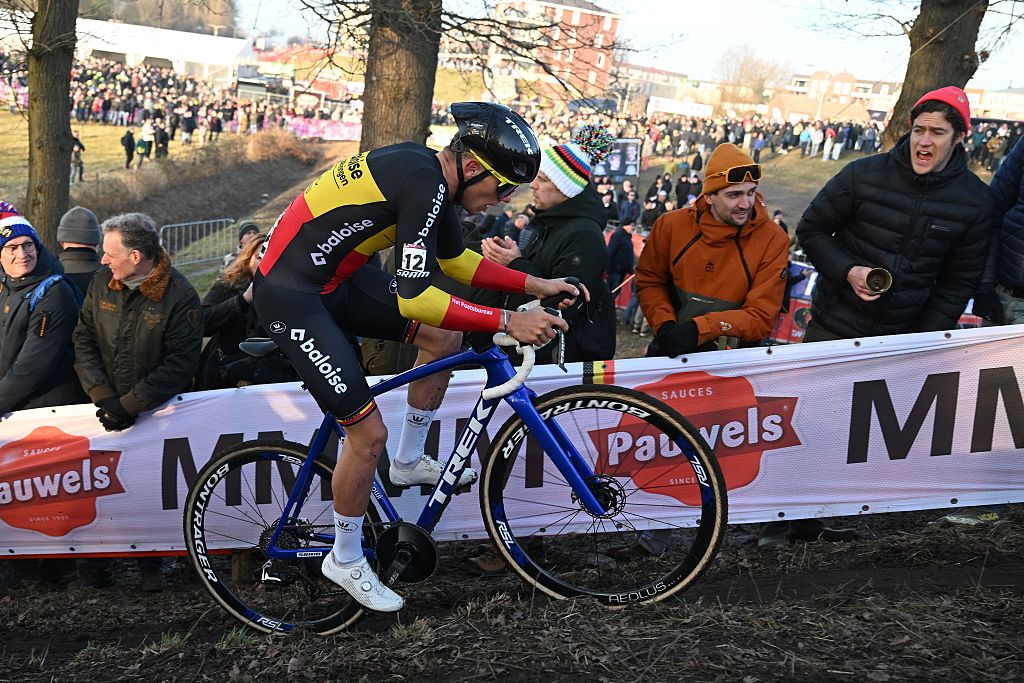Rukhsar Habibzai: An Afghan woman's journey of survival
Women's cycling team captain speaks about gender-targeted violence and fear that led to her harrowing escape from Afghanistan
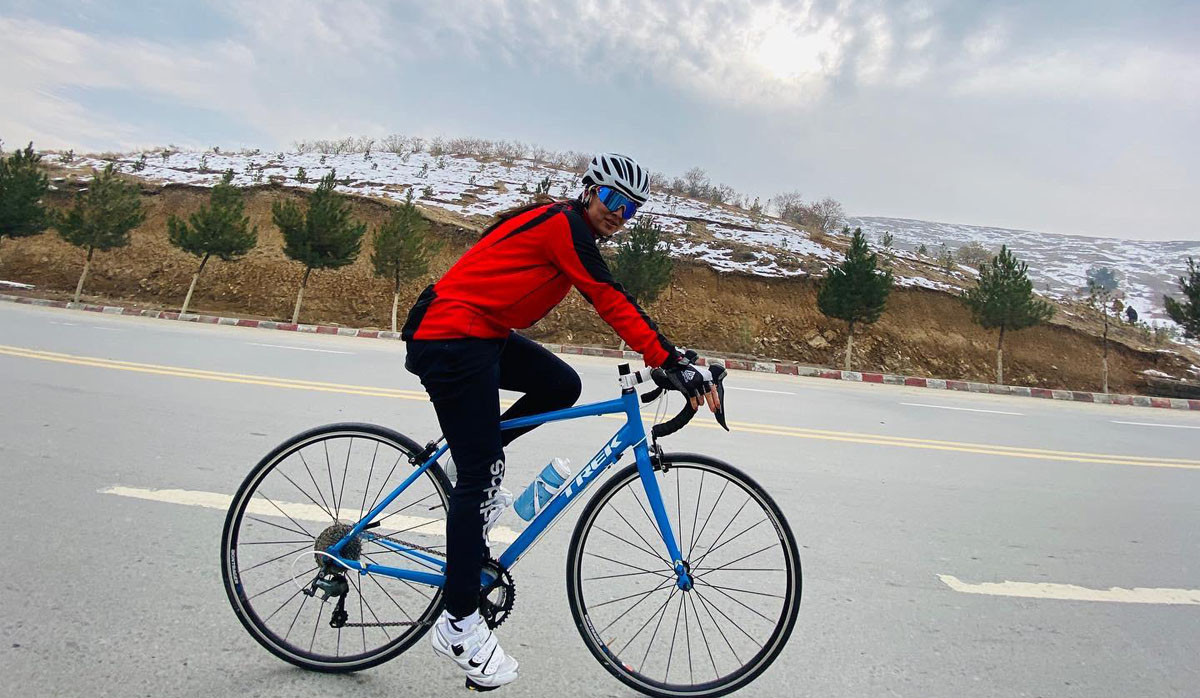
Afghan cyclist Rukhsar Habibzai was one of the many women forced to leave their country as part of the mass evacuation of vulnerable citizens who faced targeted gender violence by the Taliban. She was the captain of her nation’s first women’s cycling team, a group of ground-breaking women cyclists who were nominated for the Nobel Peace Prize in 2016 for their bravery and courage in defying gender taboos in Afghanistan.
Born in 1998 in the Ghazni Province of Afghanistan, Habibzai was three years old when the Taliban, which had enforced extreme restrictions on women's freedoms, last held majority control of Afghanistan. Twenty years later, they have taken back control and any progress that had been made toward gender equality has been rapidly undone.
Habibzai, now 23 years old, was a champion of the women’s right-to-ride revolution and finishing her final semester of a dentistry programme at Cheragh Medical University when her world came to a stop the day the Taliban captured the nation’s capital of Kabul on August 15. There were thousands desperate to flee the country before the US troops' withdrawal deadline of August 31, and there are many more vulnerable Afghan nationals still trying to evacuate.
In a harrowing recount of violence and bravery, Habibzai spoke with Cyclingnews about her life before the Taliban takeover, the moment she was forced to leave her family and evacuate her homeland, and the distressing two-month journey to safely reach the US.
Cyclingnews: Thank you for speaking with me, Rukhsar, could we begin with what your day-to-day life was like as a female cyclist during the last few years before the Taliban took over large parts of Afghanistan?
Rukhsar Habibzai: I’ve been cycling since 2012 and riding with my teammates. At that time we had peace. It was impossible for a girl to ride a bike in the city because it’s not part of our norms and not part of our culture. I was trying to make it part of our culture. I wanted to be a role model for girls who dream of doing sports. Day-by-day, I invited my friends to cycle, or to do any sport, so they could feel well. We had very poor bicycles - not carbon like professional cyclists - but still we loved to ride and we tried hard. In spite of the cultural and security problems, we accepted that we could ride our bicycles.
Security got worse and my family worried about me because if you go out, and for example, an explosion could happen, everyday security was not good. I struggled a lot because one of my dreams was to participate in the Olympic Games. I wanted to show Afghan men who are narrow-minded and believe that Afghan women are related only to the home and have to do house jobs, and not allowed to do any sports. The bicycle is different to other sports because we ride out of the city, on the roads, and it was, for them, a big shame for a girl to ride a bike. I was trying to change their minds.
The latest race content, interviews, features, reviews and expert buying guides, direct to your inbox!
Thankfully, some of them changed their minds and allowed girls to participate in our team, join our team and participate in some races. Our team was nominated for the Nobel Peace Prize in 2016, but after that the situation became worse. Sometimes I lost hope, but I tried to remember that I had big dreams, and I had to work hard to achieve my dreams.
I was a senior dental student in a private university but it was difficult to control both cycling and studying. I would practise with my teammates every Thursday and Friday. The security wasn’t good but we could ride and we had competitions, races and we regularly practised with our teammates in spite of not having equipment. This was our daily life, but at least, at that time, there were no Taliban.
CN: Were you afraid to ride your bike and was there a serious security concern for women riding their bikes?
RH: In Afghanistan, it’s not in our culture for girls to ride a bicycle. They would say [if the girls rode their bikes] they would lose their virginity, and most girls were worried and they would ask me if this was true. I would tell them, 'no, it’s not true, that is false, so please don’t listen to these stupid things'. I tried to change [girl’s and women’s] minds, to make them stronger, and not to listen to these [notions].
When we rode our bikes in Kabul city, people would throw stones at us or whatever they had in their hands. They would say, 'a bicycle is not for girls' or 'you are not good girls, you are bad' and they had these ideas. Most of the boys told us to leave cycling because it was not in our culture, it was bad for girls, and that we were creating opportunities for other girls to do bad things. Most of them would threaten me, beat me, I was riding and someone came beside me and threw me to the road. I got injured. I would never stop cycling. I wanted to show that women could cycle and to show that girls can do whatever they wanted. I wanted to be a role model and encourage other girls to join cycling, or any sport.
CN: What are your family’s views about women - and you - riding a bike and are they supportive?
RH: At first no, because my mother was very worried about me. I can accept why they didn’t support it, at first, because of security and because of other people’s [views]. When I rode a bicycle for the first time and joined the team, our people we know in our area felt that it was shameful for a girl to ride a bicycle, but my mom was worried about the security. She was always telling me, 'I would support you in every way that you want because you are strong but I am not happy because the security in Afghanistan is not good for cyclists'. We had no area to practice, traffic and cars were annoying us. My dad, brother, and mom, also supported me, but at first it was a problem because of security. When they saw how much I loved cycling, and wanted to be a cyclist, they could see I was working hard, and they said they would do anything to support me but to be careful.
CN: Did you need to ride with security for protection?
RH: At first I rode alone but after I was pulled off my bike and some people said bad words to me and tried to throw things at me, I went with a group of teammates. It was a group of girls and we had to have men with us, without men we weren’t allowed to ride, and so we had two or three men come to protect us, but no guards.
CN: If someone pulled you from your bike or threw stones at you, could you notify law enforcement?
RH: Unfortunately no - I wish. Every time they threw stones I would get angry because there was no one to report it to; no police, no security. I remember one day, I told the police about the people who were [assaulting] us but they told me, 'you are a bad girl. Why are you cycling? It’s not for you'. After that, I decided not to tell anyone because they didn’t support us.
CN: How did your family, and the people you know, react to your achievement when the women’s cycling team was nominated for the Nobel Peace Prize in 2016?
RH: When we heard the news that our team was nominated for the Nobel Peace Prize, my family felt very proud. They were praying for us to get the Nobel Peace Prize, but we didn’t, we had only been nominated. The people were supportive.
Getting out
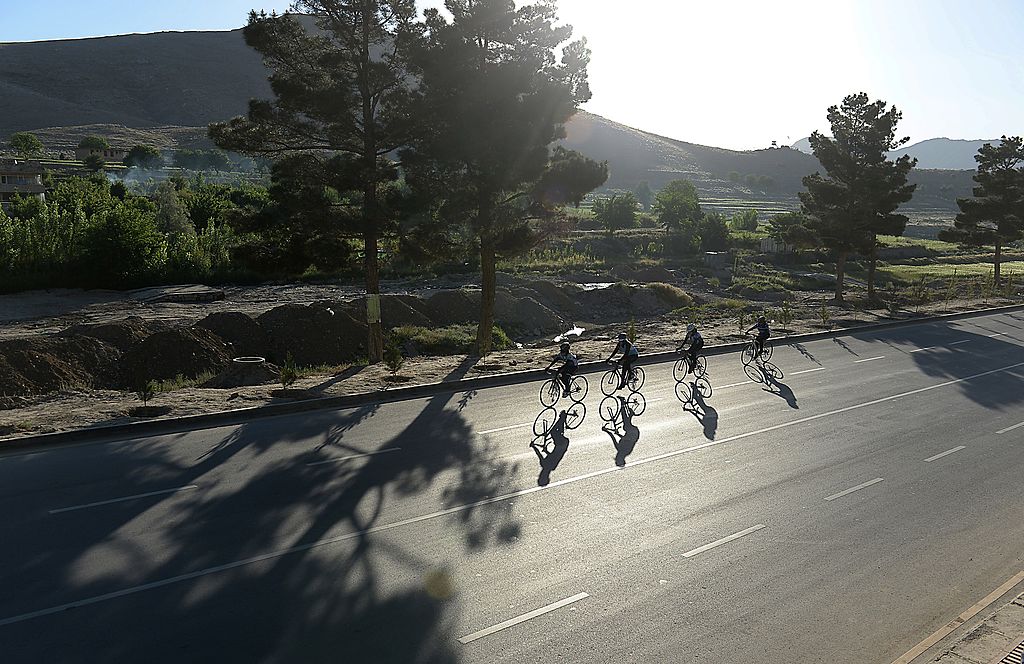
CN: What were your immediate reactions and fears when you learned that the Taliban had taken over large parts of Afghanistan in August?
RH: Every day we saw in the news that they were occupying each of the provinces and then 80 per cent of Afghanistan was controlled by the Taliban. I never expected that one day they could take over the country again. My mom told me stories about the Taliban, because I wasn’t born the last time they occupied to country [1996 and 2001- ed]. My mom told me that under the Taliban government [women] weren’t allowed to go outside, and sports, jobs and school were forbidden. I never expected that they would take over again. I thought maybe they would control Afghanistan but not Kabul because it’s the capital of the country, the biggest city, and it has improved a lot. I hurt now when I see the news of the Taliban control.
I lost my hope. I can’t ride a bike anymore, it’s not allowed. Women are not allowed to wear colourful dresses or have a smartphone. I always said to my teammates that we were not going back to that, but now, we are going back about 20 years. We worked hard for 20 years, studied, improved in sports, education, we had a woman parliament member, we moved forward a lot.
I was in my last semester at university when they took over Kabul. I was crying and running to get home. I still have a view in my mind of people closing shops, running, everyone was trying to get home. I worked so hard. Now all the schools are closed and girls are not allowed to go to university. What can I do? I was at the end level, almost finished, about to graduate. I did not get my diploma. I did not graduate. I had to stay at home. It was difficult for me, and for all of Afghan women and girls. I had depression. I had bad days. Everyone did.
My dream was to make cycling a part of our culture, for everyone, to use the bike for transportation and sport, and I was creating a cycling club for women and girls only called the Cheetah Cycling Club. I had dreams. Everything is gone.
A friend of mine helped me to get a carbon bike and I bought a frame for $800, a used one from Iran. I was so sad that I had a good bike, the bike I always dreamed of, but now I am not allowed to have it or to go out and ride it. I felt like we were the new generation and questioned why this was happening to us.
CN: Were you afraid for your own personal safety and for your life?
RH: I was part of a documentary on a German channel ZDF Heute Nachrichten about the Taliban and I was worried because they know me, that I am cyclist. I was waiting for them to come and kill me. Some of them followed me on Instagram and texted me to try to scare me. I had really bad days.
CN: How did you make the decision to evacuate and was there a discussion with your family?
RH: My family was worried because of the documentary. They said, 'If there is anyone to help you, please go'. I told them that I couldn’t leave without them, without my family, I didn’t want that. My mom forced me to go. She said, 'We are safe but you are not safe here, please go'.
CN: Who helped you evacuate?
RH: Liên Johnson [a former employee at Specialized who now works as a contractor at Google and helps, alongside Mountain Bike Afghanistan, organise on-going evacuation efforts out of Afghanistan - ed.]. She saved my life and I am here because of her. She put my name on an evacuation flight. There were problems entering the airport in Kabul. There were more than 15,000 people trying to get to the airport gates. Some of them were controlled by the Taliban, some by the UK army and some by the US army. If you wanted to enter the US army gate you had to have a visa or green card.
I was at the Kabul airport for four days with no food or water. I was dying and I thought it was the end of my life. Some US soldiers brought us water but there were too many people to help. I lost hope.
Liên sent me a gate pass through email. She also put my name on the Poland evacuation flight and the Poland embassy emailed me. I showed the evacuation flight email to the US soldier and my name was on the evacuation list. They still tried to ignore me because there were so many people. She later emailed me and said it wasn’t safe and that there might be an explosion at the airport. I knew that already but I was eventually allowed through to the airport.
CN: You were inside the airport during the two explosions that happened outside of the Kabul airport. Could you tell us what happened from your own perspective?
RH: I was inside the airport about one or two hours before the explosions happened. Everyone was running. The US army closed the area for five or six hours and we went to a safe place. I was very worried about whether my family members were trying to get to the airport or if they were injured in the explosions.
CN: Did you know where you were going once you got on the evacuation flight?
RH: It was [initially] arranged for me to go to Poland and then to the US. A soldier sent me directly to the US biometrics entry area for the US. When we left, there were more than 60 people in a [military] airplane and we were sitting on the floor because there were no seats. I hadn’t eaten in four days. I had tension and depression. My flight was to Qatar where I stayed for six days in a hanger. I was then taken to Germany where I spent 45 days on a US army base in a tent with 280 people and 70 families. I was so far from my family and Kabul, but I felt safe. I arrived in the US this month.
'I feel like I am a newborn baby'
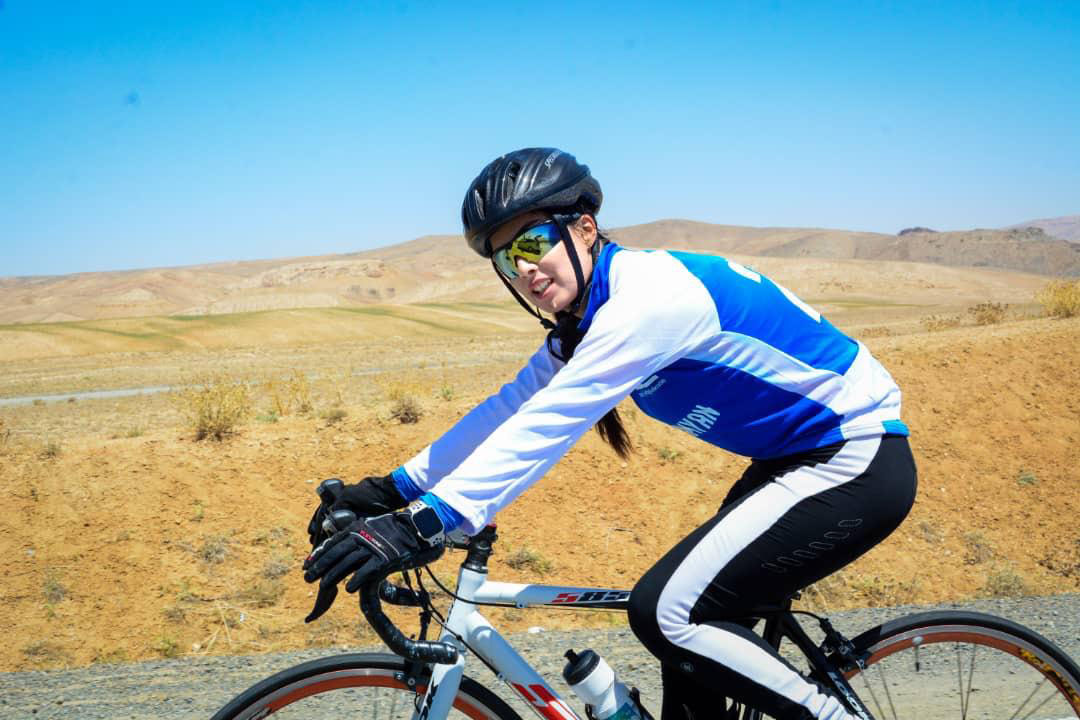
CN: How did you feel upon your arrival to the US?
RH: I never thought that one day I would come to the US. We had a long journey to get here and I couldn’t believe it when we arrived. Once I saw the American flags, I accepted that I was finally in America. We were taken to a camp where we did the biometric entry, interviews, and processing. I came from Afghanistan with the one dress that I was wearing. My backpack was taken away by the US soldiers after the explosions in Kabul. At the immigration centre in the US, I was in a home with a room that was for girls without family. Liên, who helped me evacuate, shipped some clothes, jackets, and shoes for me.
CN: Have you communicated with your family back in Afghanistan?
RH: Yes, we were all crying. It’s not in our culture as an adult to live alone. We all live together. I cried almost every day when I was in Germany because so many people travelled with their families, their parents, and I was alone.
CN: Do you believe that you could go back to Afghanistan in the future one day?
RH: I don’t know. I love my homeland. I love my country and I would never have left my country. If we all leave, who will serve our country? But right now, our 20 years of hard work and education is now nothing. My parents are waiting for their flights to evacuate. My family are in a safe place now, and they are waiting for their flights, most probably tomorrow [Monday], they have a flight out. It’s okay for me to share my name and photo because my family is safe.
CN: What is the next step for you as you build a new life in the US?
RH: When I was in Germany, I received a message from Nicola Cranmer, offering me a spot on team Twenty24. I never thought that one day I would be a member of an American cycling team. It made me happy to know that I can continue my dream of cycling and to go to the Olympic Games. I’m sure that one day I will participate in the Olympic Games.
They won’t accept my university transcripts so I will have to start over again. I want to be a good dentist. The US soldiers served a lot for us [to evacuate] and now it’s my turn to serve for the American people because they saved my life. I remember those soldiers who saved my life. I know that about 13 US soldiers lost their lives in the explosions at the Kabul airport in order to save our lives. I want to serve for those American military people who helped me, those who saved my life, but they lost their lives because of me, and I hope that one day I can do that.
I have a bright future, goals, plans. I know that I have to start from zero. I feel like I am a newborn baby. I even did the vaccinations for chicken pox and measles, like when a baby is born. I feel, in spite of the fact that my country is not in a good way and my homeland and Afghan people are not safe, I still see a future in America. I feel free.
CN: What are your hopes for your country and for other women in Afghanistan?
RH: I hope that the women in Afghanistan feel freedom and peace. I hope for peace for my country without war. I hope for peace for all of the women who worked hard for women’s rights and for their futures. I hope that one day I will hear the news that there is no longer the Taliban in Afghanistan.
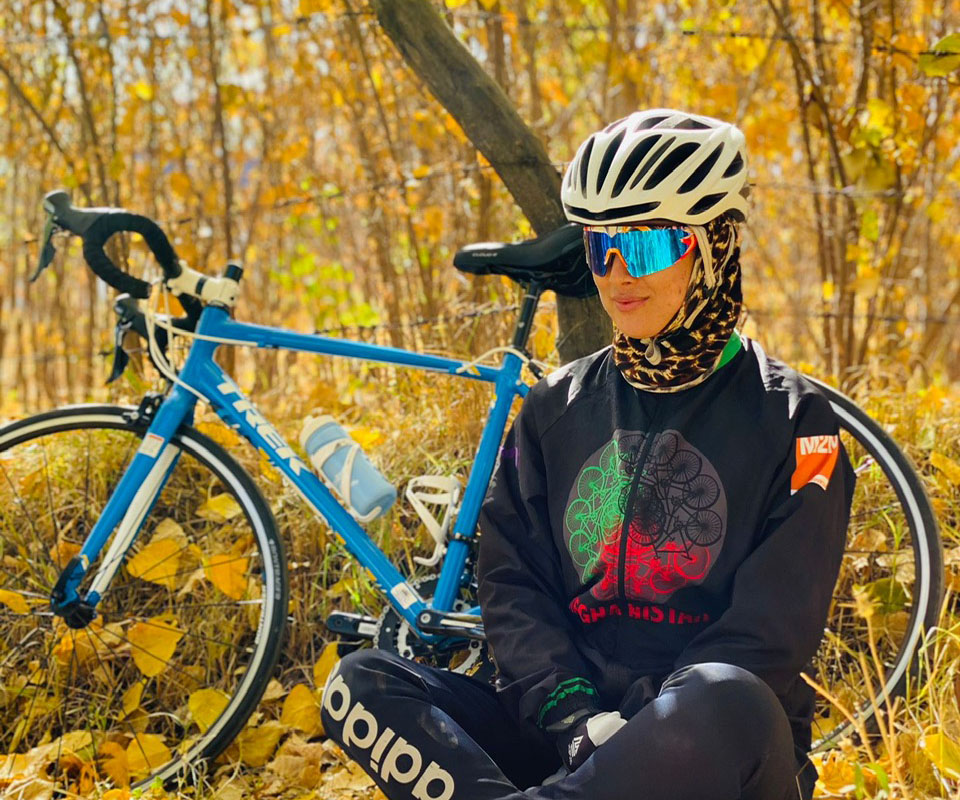

Kirsten Frattini has been the Editor of Cyclingnews since December 2025, overseeing editorial operations and output across the brand and delivering quality, engaging content.
She manages global budgets, racing & events, production scheduling, and contributor commissions, collaborating across content sections and teams in the UK, Europe, North America, and Australia to ensure audience and subscription growth across the brand.
Kirsten has a background in Kinesiology and Health Science. She has been involved in cycling from the community and grassroots level to professional cycling's biggest races, reporting on the WorldTour, Spring Classics, Tours de France, World Championships and Olympic Games.
